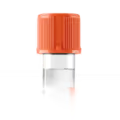Do I need a Cardio IQ Insulin test?
Struggling with weight gain, constant cravings, or stubborn belly fat that won't budge? Could elevated insulin be driving these frustrations?
Insulin controls how your body stores fat and uses sugar for energy. When insulin levels run high, your body shifts into fat-storage mode, making weight loss incredibly difficult.
Testing your insulin gives you a vital snapshot of your metabolic health, revealing whether insulin resistance is fueling your weight struggles and cravings. This insight empowers you to personalize your nutrition and lifestyle choices to finally break through those barriers.
Method: FDA-cleared clinical laboratory assay performed in CLIA-certified, CAP-accredited laboratories. Used to aid clinician-directed evaluation and monitoring. Not a stand-alone diagnosis.

A derived biomarker is a value that is calculated from other directly measured biomarkers rather than being measured directly in the lab.
Get tested with Superpower
If you’ve been postponing blood testing for years or feel frustrated by doctor appointments and limited lab panels, you are not alone. Standard healthcare is often reactive, focusing on testing only after symptoms appear or leaving patients in the dark.
Superpower flips that approach. We give you full insight into your body with over 100 biomarkers, personalized action plans, long-term tracking, and answers to your questions, so you can stay ahead of any health issues.
With physician-reviewed results, CLIA-certified labs, and the option for at-home blood draws, Superpower is designed for people who want clarity, convenience, and real accountability - all in one place.
Key benefits of Cardio IQ Insulin testing
- Measures how much insulin your pancreas makes to control blood sugar.
- Spots insulin resistance years before diabetes or prediabetes appears on standard tests.
- Flags metabolic imbalance that raises risk for heart disease and fatty liver.
- Explains stubborn weight gain, fatigue, or sugar cravings despite normal glucose levels.
- Guides lifestyle changes and medication decisions to prevent type 2 diabetes progression.
- Tracks how well diet, exercise, or treatment improves your insulin sensitivity.
- Best interpreted with fasting glucose and hemoglobin A1c for complete metabolic insight.
What is Cardio IQ Insulin?
Insulin is a hormone made by specialized cells in your pancreas called beta cells. These cells release insulin into your bloodstream in response to rising blood sugar, especially after you eat carbohydrates or protein.
Your body's master key for fuel storage
Insulin acts like a key that unlocks your cells so they can absorb glucose (sugar) from your blood and use it for energy. It also signals your liver, muscles, and fat tissue to store excess glucose for later use.
A window into metabolic health
The Cardio IQ Insulin test measures the amount of insulin circulating in your blood at a given moment. This snapshot reveals how hard your pancreas is working to manage your blood sugar. When cells become resistant to insulin's signal, your pancreas compensates by producing more, leading to elevated insulin levels even when blood sugar appears normal. This pattern often precedes prediabetes and cardiovascular risk, making insulin a valuable early marker of metabolic stress.
Why is Cardio IQ Insulin important?
Cardio IQ Insulin measures fasting insulin, a hormone that governs how your body stores and uses energy from food. It reveals whether your cells are responding normally to insulin's signals or whether your pancreas is overproducing insulin to overcome resistance. This test offers an early window into metabolic health, often detecting dysfunction years before blood sugar rises.
When insulin runs too low
Very low fasting insulin can signal an exhausted or damaged pancreas, sometimes seen in advanced type 1 diabetes or late-stage type 2 diabetes. Without enough insulin, glucose can't enter cells, leading to fatigue, unintended weight loss, and dangerously high blood sugar. In rare cases, low insulin reflects hypopituitarism or severe malnutrition.
When insulin climbs too high
Elevated fasting insulin, even with normal glucose, is a hallmark of insulin resistance. Your pancreas compensates by secreting more insulin to keep blood sugar stable. Over time, this drives weight gain (especially around the abdomen), raises blood pressure, disrupts cholesterol, and increases risk for type 2 diabetes, fatty liver, and cardiovascular disease. Women with polycystic ovary syndrome often show high insulin alongside irregular cycles and difficulty losing weight.
The metabolic crossroads
Insulin sits at the center of energy metabolism, linking glucose control, fat storage, inflammation, and vascular health. Tracking fasting insulin helps identify metabolic syndrome early, when lifestyle changes can still reverse the trajectory toward diabetes and heart disease.
What do my Cardio IQ Insulin results mean?
Low fasting insulin levels
Low values usually reflect efficient insulin signaling and low insulin demand. This occurs when cells respond well to insulin and blood sugar remains stable with minimal hormonal effort. Very low insulin alongside low blood sugar may indicate inadequate insulin production from the pancreas, though this is uncommon in fasting tests ordered for metabolic screening.
Optimal fasting insulin levels
Being in range suggests your pancreas is producing appropriate amounts of insulin to maintain normal blood sugar without overworking. Optimal fasting insulin typically sits toward the lower end of the reference range, often below 10 microunits per milliliter, reflecting good insulin sensitivity. This indicates your cells are responding efficiently to insulin's signal to take up glucose.
High fasting insulin levels
High values usually reflect insulin resistance, a state where cells respond poorly to insulin's signal. The pancreas compensates by producing more insulin to maintain normal blood sugar. Elevated fasting insulin often precedes rises in blood glucose by years and serves as an early marker of metabolic stress. This pattern is common with central adiposity, physical inactivity, and diets high in refined carbohydrates.
Factors that influence insulin levels
Insulin levels fluctuate throughout the day in response to meals, so fasting status matters greatly. Stress, illness, certain medications including corticosteroids, and hormonal conditions can elevate insulin. Pregnancy naturally increases insulin resistance in later trimesters.

.svg)









.avif)
.avif)


